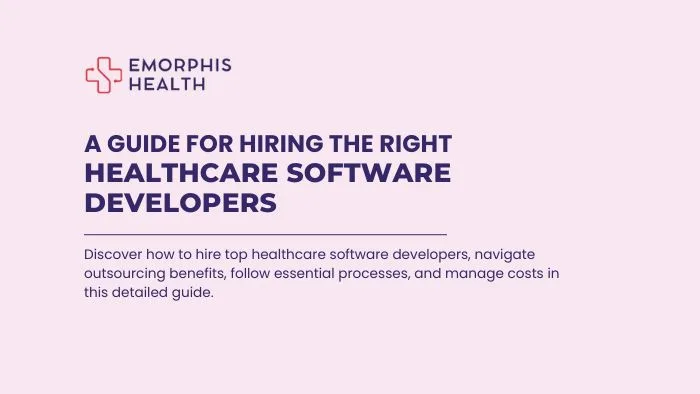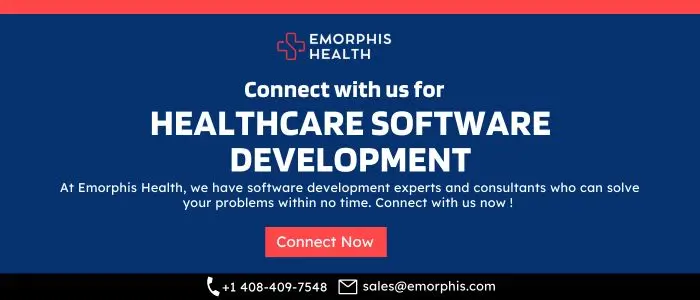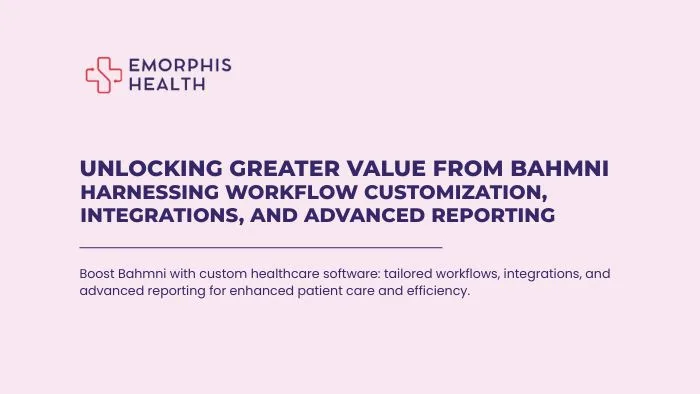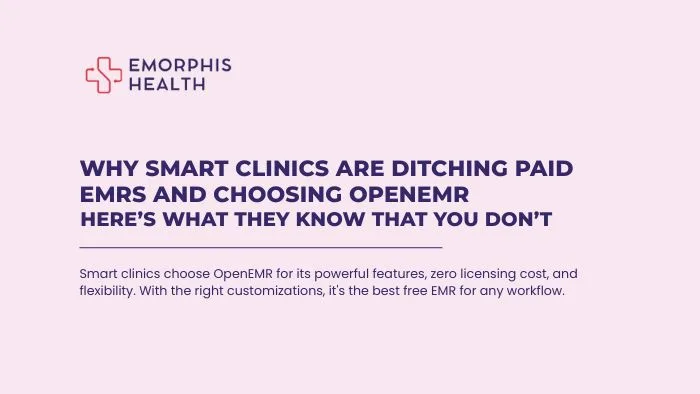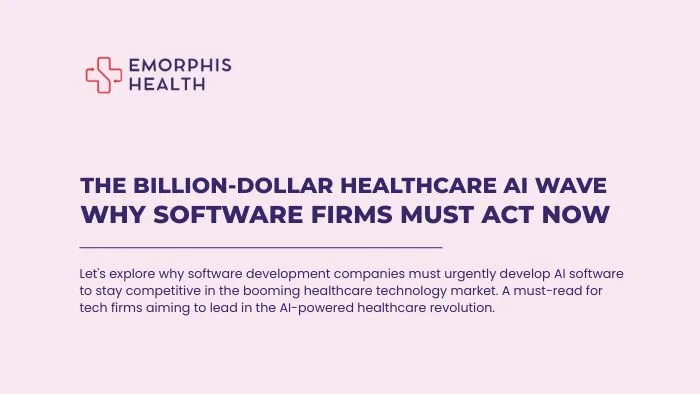Overview of Healthcare Software Development and Healthcare Software Developers
See Contents
- 1 Overview of Healthcare Software Development and Healthcare Software Developers
- 2 What will you learn?
- 3 Qualities of Top Healthcare Software Developers
- 4 Where to Find Healthcare Software Developers?
- 5 How to Identify the Best Healthcare Software Developers?
- 6 The Advantages and Disadvantages of Outsourcing Healthcare Software Development
- 7 Checklist for Outsourcing Healthcare Software Development
- 8 Process To Hire Experienced Healthcare Software Developers
- 9 Cost Factors Checklist for Healthcare Software Development
- 10 Conclusion
Embarking on the journey of healthcare software development can feel like stepping into a labyrinth. In this intricate landscape, outsourcing healthcare software development or finding the right software developers is paramount. These healthcare software developers and experts are the architects behind innovative solutions that streamline patient care, optimize operations, and ensure compliance with regulatory standards.
Moreover, healthcare software developers possess unique technical prowess and domain-specific knowledge. They understand the complexities of the healthcare industry, including the importance of patient privacy, data security, and regulatory compliance.
In fact, healthcare software developers play a crucial role in revolutionizing healthcare delivery. Their creations empower healthcare providers to deliver more efficient and effective care, ultimately improving patient outcomes and enhancing the overall healthcare experience.
As a matter of fact, the demand for skilled healthcare software developers is on the rise. With advancements in technology and evolving healthcare needs, organizations are increasingly relying on these professionals to develop tailored solutions that meet their specific requirements.
What will you learn?
- Learn about the qualities of top healthcare software developers, where to find them, and the benefits and challenges of outsourcing in the complex landscape of healthcare software development.
- Understand the process of identifying the best healthcare software developers through portfolio assessment, interviewing techniques, technical proficiency tests, and reviewing references and reviews.
- Explore the advantages and disadvantages of outsourcing healthcare software development, including the benefits of efficiency and cost-effectiveness and the challenges of communication and quality control.
- Discover a comprehensive checklist for outsourcing healthcare software development, covering compliance, data security, development methodologies, communication protocols, quality assurance, and scalability.
- Gain insights into the cost factors checklist for healthcare software development, including considerations such as project scope, pricing models, resource allocation, development timeframe, technology stack, scalability, quality assurance, regulatory compliance, project management, and contingency planning.
Let us explore the qualities to look for in top healthcare software developers, explore where to find them, and discuss the benefits of outsourcing healthcare software development. Additionally, we’ll provide a checklist to ensure you partner with the right team for your healthcare software development needs. So let’s navigate this maze together and unlock the potential of healthcare software development.
Qualities of Top Healthcare Software Developers
1. Technical Proficiency – Building Solutions that Work
Healthcare software developers are the backbone of innovation in the medical field. Their technical proficiency enables them to create robust solutions that address the unique needs of healthcare organizations. From electronic health record (EHR) systems to telemedicine platforms, top healthcare software developers possess the skills to design and implement cutting-edge software that improves patient care and streamlines workflows. Moreover, their expertise extends beyond coding to encompass software architecture, database management, and system integration, ensuring that the solutions they build are scalable, reliable, and user-friendly.
2. Understanding of Regulatory Compliance – Safeguarding Patient Data
Data security and regulatory compliance are of utmost importance in the healthcare industry. Top healthcare software developers have a deep understanding of the regulations governing the handling and storage of sensitive patient information, such as HIPAA (Health Insurance Portability and Accountability Act) in the United States. They implement stringent security measures to safeguard patient data against unauthorized access, breaches, and cyber threats. By adhering to industry standards and best practices, they ensure that healthcare organizations remain compliant while leveraging technology to improve patient care.
3. Experience in Healthcare Domain – Insight into Industry Challenges
Experience is invaluable in the healthcare domain, where developers must navigate complex challenges and understand the intricacies of medical workflows. Top healthcare software developers bring years of industry experience to the table, allowing them to anticipate the needs of healthcare providers and develop solutions that address pain points effectively. Whether it’s optimizing clinical workflows, enhancing patient engagement, or improving interoperability between systems, their deep insight into industry challenges enables them to deliver tailored solutions that drive meaningful outcomes.
4. Effective Communication Skills – Bridging the Gap Between Tech and Healthcare
Communication is key in healthcare software development, where developers must collaborate closely with healthcare professionals, administrators, and other stakeholders. Top healthcare software developers possess excellent communication skills, allowing them to bridge the gap between technology and healthcare effectively. They listen attentively to the needs of end-users, translate technical jargon into layman’s terms, and communicate project updates and milestones clearly and concisely. By fostering open communication and collaboration, they ensure that the final product aligns with the vision and goals of the healthcare organization.
5. Problem-solving Aptitude – Crafting Innovative Solutions
Innovation lies at the heart of healthcare software development, where developers are tasked with solving complex problems and driving continuous improvement. Top healthcare software developers possess a strong problem-solving aptitude, enabling them to tackle challenges creatively and devise innovative solutions. Whether it’s overcoming interoperability issues, optimizing performance, or integrating emerging technologies like artificial intelligence and machine learning, they approach each problem with a solutions-oriented mindset. By embracing creativity and ingenuity, they push the boundaries of what’s possible in healthcare software development, driving positive change and improving patient outcomes.
Now that we’ve explored the essential qualities of top healthcare software developers, the next step is finding the right team to bring your vision to life.
Where to Find Healthcare Software Developers?
In the ever-evolving landscape of healthcare technology, finding the right team of software developers is paramount to success. Emorphis Health, a distinguished healthcare software product engineering company, stands at the forefront of this industry. With a wealth of experience and expertise, Emorphis Health offers a comprehensive suite of services covering every aspect of software development for the healthcare sector.
At Emorphis Health, we understand that the journey of healthcare software development encompasses various stages, each requiring specialized skills and knowledge. From the initial stages of consulting and requirement analysis to the development of a minimum viable product (MVP), beta deployment, compliance integration, and ultimately, the launch and deployment phase, Emorphis Health’s team of experts is equipped to handle every step of the process with precision and efficiency.
Our team comprises seasoned professionals who excel in their respective domains, ensuring that your project receives the attention and expertise it deserves at every stage. Whether you need assistance in drafting requirements, conducting thorough analysis, or developing a robust software solution, Emorphis Health has the talent and resources to meet your needs.
Moreover, our commitment to excellence extends beyond the development phase. Emorphis Health provides comprehensive maintenance and support services to ensure that your software solution remains optimized, secure, and up-to-date long after its initial launch. With proactive monitoring, timely updates, and responsive support, we strive to deliver a seamless experience for both you and your end-users.
Get Quotes from Healthcare Software Developers – Comparing Budget Options
As you embark on your journey to develop healthcare software solutions, budget considerations play a significant role. Emorphis Health understands the importance of financial planning and offers transparent pricing options tailored to your specific requirements. By reaching out to Emorphis Health for a quote, you gain access to detailed cost breakdowns and budget estimates, allowing you to make informed decisions and compare budget options effectively.
Our competitive pricing ensures that you receive exceptional value for your investment without compromising on quality or functionality. With Emorphis Health as your partner, you can rest assured that your project will be delivered on time, within budget, and to the highest standards of excellence.
Overall, when it comes to finding healthcare software developers who can meet your needs with expertise, efficiency, and affordability, Emorphis Health is the trusted partner you can rely on. Contact us today to learn more about our services and how we can help bring your healthcare software vision to life.
Now that you understand where to find healthcare software developers, the next crucial step is identifying the best fit for your project. Let’s delve into the key factors to consider when evaluating potential partners.
How to Identify the Best Healthcare Software Developers?
In the competitive landscape of healthcare software development, finding the right team of developers can be daunting. However, with the right approach, you can ensure that you partner with the best fit for your project. Let’s explore the key strategies for identifying top-tier healthcare software developers.
A. Portfolio Assessment – Evaluating Past Projects
One of the most effective ways to assess the capabilities of healthcare software developers is by reviewing their portfolio of past projects. A comprehensive portfolio provides insight into the types of solutions they’ve developed, their level of expertise, and their ability to meet client needs. Look for developers who have experience working on projects similar to yours, as this indicates familiarity with the challenges and requirements of the healthcare industry.
Moreover, examining their portfolio allows you to gauge the quality of their work, including user interface design, functionality, and scalability. Pay attention to any case studies or success stories that demonstrate their ability to deliver results and solve complex problems for their clients.
B. Interviewing Techniques – Unveiling Skills and Compatibility
In addition to reviewing their portfolio, conducting interviews is essential for assessing the skills and compatibility of healthcare software developers. Prepare a set of questions that delve into their technical expertise, project management approach, and communication style. During the interview process, pay attention to how they articulate their ideas, respond to challenges, and demonstrate their understanding of your project requirements.
Moreover, assess their compatibility with your team and organizational culture. Effective collaboration is key to the success of any software development project, so ensure that you feel comfortable working with the developers and that they align with your values and goals.
C. Technical Proficiency Tests – Ensuring Capability
To further validate the technical proficiency of healthcare software developers, consider administering technical proficiency tests as part of the evaluation process. These tests can assess their coding skills, problem-solving abilities, and familiarity with relevant technologies and frameworks. Additionally, consider conducting coding challenges or simulations that mimic real-world scenarios to evaluate their ability to perform under pressure and meet deadlines.
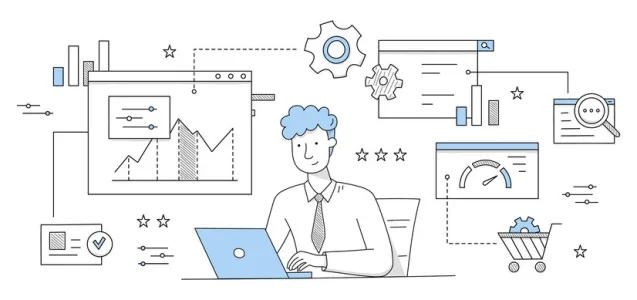

Moreover, seek developers who prioritize continuous learning and stay abreast of emerging technologies and best practices in healthcare software development. A commitment to professional growth and skill development demonstrates their dedication to delivering high-quality solutions that meet the evolving needs of the healthcare industry.
D. References and Reviews – Gauging Reputation and Reliability
Finally, don’t overlook the importance of references and reviews when evaluating healthcare software developers. Reach out to their past clients and ask for references to learn about their experience working with the developers. Inquire about the quality of their work, adherence to timelines and budgets, and overall satisfaction with the partnership.
Additionally, check online reviews and testimonials to gain insights into the developers’ reputation and reliability. Positive reviews and endorsements from satisfied clients are indicative of a developer’s track record of success and commitment to client satisfaction.
Overall, identifying the best healthcare software developers requires a thorough and strategic approach. By assessing their portfolio, conducting interviews, administering technical proficiency tests, and seeking references and reviews, you can make an informed decision and choose a partner who aligns with your project goals and vision.
The Advantages and Disadvantages of Outsourcing Healthcare Software Development
Outsourcing healthcare software development has become increasingly popular in recent years, offering both benefits and challenges to organizations in the healthcare industry. Let’s explore the advantages and disadvantages of outsourcing healthcare software development.
Benefits of Outsourcing – Efficiency and Cost-effectiveness
Outsourcing healthcare software development can offer significant benefits, particularly in terms of efficiency and cost-effectiveness. By partnering with external healthcare software developers, organizations can leverage specialized expertise and resources without the need to invest in hiring and training an in-house team. This can lead to faster development cycles and reduced time-to-market for healthcare software solutions.
Moreover, outsourcing can be cost-effective, as it allows organizations to access a global talent pool and benefit from lower labor costs in offshore locations. This can result in substantial savings compared to hiring local developers, especially for long-term or large-scale projects.
Additionally, outsourcing healthcare software development can provide scalability and flexibility, allowing organizations to scale their development teams up or down as needed to meet changing project requirements or business demands. This agility can be particularly advantageous in the dynamic and rapidly evolving healthcare industry.
Challenges of Outsourcing – Communication and Quality Control
However, outsourcing healthcare software development is not without its challenges. One of the primary concerns is communication, particularly when working with remote teams or offshore development partners. Differences in time zones, language barriers, and cultural differences can hinder effective communication and collaboration, leading to misunderstandings, delays, and misaligned expectations.
Moreover, maintaining quality control can be challenging when outsourcing healthcare software development. Without direct oversight and control over the development process, organizations may face difficulties in ensuring that the final product meets their quality standards and requirements. This can result in issues such as bugs, errors, and subpar performance, which can ultimately impact patient care and organizational reputation.
Additionally, outsourcing may raise concerns about data security and confidentiality, particularly when sensitive patient information is involved. Organizations must carefully vet potential outsourcing partners and implement robust security measures to mitigate the risk of data breaches or unauthorized access.
In conclusion, while outsourcing healthcare software development offers notable benefits in terms of efficiency and cost-effectiveness, it also presents challenges related to communication, quality control, and data security. By weighing the pros and cons carefully and selecting the right outsourcing partner, organizations can leverage the advantages of outsourcing while mitigating potential risks and challenges.
Now that we’ve explored the advantages and disadvantages of outsourcing healthcare software development, let’s delve into a comprehensive checklist to ensure a smooth and successful outsourcing process.
Checklist for Outsourcing Healthcare Software Development
Outsourcing healthcare software development can be a strategic decision to leverage specialized expertise and resources. However, to ensure a successful partnership, it’s essential to establish a comprehensive checklist that covers critical aspects of the outsourcing process.
1. Compliance with Regulatory Standards – Upholding Patient Privacy
When outsourcing healthcare software development, compliance with regulatory standards is non-negotiable. Healthcare software developers must adhere to strict regulations such as HIPAA (Health Insurance Portability and Accountability Act) to uphold patient privacy and protect sensitive health information. Ensure that your outsourcing partner has a deep understanding of these regulations and implements robust measures to safeguard patient data throughout the development process.
2. Data Security Measures – Protecting Sensitive Information
Data security is paramount in healthcare software development, where the stakes are high in terms of protecting sensitive patient information. Your outsourcing partner should have stringent data security measures in place to prevent unauthorized access, data breaches, and other security threats. This includes encryption protocols, access controls, regular security audits, and compliance with industry best practices.
3. Development Methodologies – Ensuring Agile and Scalable Solutions
Effective development methodologies are essential for delivering agile and scalable healthcare software solutions. Look for outsourcing partners who follow industry-standard methodologies such as Agile or Scrum, allowing for iterative development, continuous improvement, and flexibility in responding to changing requirements. Moreover, ensure that the development process is scalable to accommodate future enhancements and expansions as your healthcare organization grows.
4. Communication Protocols – Establishing Clear Channels
Clear and effective communication is critical for the success of any outsourcing partnership. Establishing communication protocols upfront ensures that all stakeholders are aligned, informed, and involved throughout the development process. This includes regular project updates, status meetings, and a designated point of contact for addressing concerns or resolving issues. Moreover, leverage communication tools and technologies to facilitate real-time collaboration and transparency.
5. Quality Assurance Processes – Maintaining High Standards
Maintaining high standards of quality assurance is essential for delivering reliable and error-free healthcare software solutions. Your outsourcing partner should have robust quality assurance processes in place, including rigorous testing protocols, code reviews, and performance evaluations. This ensures that the final product meets your specifications, functions as intended, and complies with industry standards and best practices.
6. Scalability and Flexibility – Adapting to Future Needs
Lastly, ensure that your outsourcing partner offers scalability and flexibility to adapt to future needs and requirements. Healthcare software solutions must evolve to meet changing regulatory requirements, technological advancements, and user demands. Your outsourcing partner should have the expertise and resources to support ongoing maintenance, updates, and enhancements, ensuring that your software solution remains relevant and effective in the long run.
In conclusion, by adhering to this comprehensive checklist, you can mitigate risks, ensure compliance, and maximize the success of your outsourcing partnership with healthcare software developers.
Now that we’ve established a checklist for outsourcing healthcare software development, let’s delve into the process of hiring experienced healthcare software developers who can meet your project requirements and deliver exceptional results.


Process To Hire Experienced Healthcare Software Developers
When it comes to developing healthcare software solutions, hiring experienced professionals is paramount to success. Follow these steps to ensure you hire the right team for your project.
Step 1. Define Your Requirements
Before beginning the hiring process, clearly define your project requirements, including the scope, timeline, and budget. Identify the specific skills and expertise you need in healthcare software developers to meet your project goals.
Step 2. Research Top-Rated Healthcare Software Development Services
Start by researching top-rated healthcare software development services. Look for companies with a proven track record of delivering high-quality solutions and positive client testimonials. Consider factors such as industry experience, technical expertise, and reputation in the healthcare sector.
Step 2.1 Get Affordable Healthcare Software Development Solutions
While quality is essential, affordability is also a key consideration. Compare pricing and quotes from multiple healthcare software development services to ensure you get the best value for your budget. Seek companies that provide competitive rates without sacrificing quality.
Step 2.2 Consider Outsourcing to a Professional Healthcare Software Development Team
Outsourcing to a professional healthcare software development team can offer numerous benefits, including access to specialized expertise, scalability, and cost-effectiveness. Evaluate outsourcing partners based on their experience, capabilities, and alignment with your project requirements.
Step 2.3 Evaluate Custom Healthcare Software Development Providers
Custom healthcare software development providers offer tailored solutions to meet your unique needs. Look for providers who have experience developing custom software solutions for the healthcare industry and can adapt to your specific requirements.
Step 3. Review Portfolios and Case Studies
Once you’ve identified potential healthcare software developers, review their portfolios and case studies to assess the quality of their work and their ability to deliver solutions similar to your project. Look for examples of projects that demonstrate expertise in healthcare software development and alignment with your goals.
Step 4. Conduct Interviews
Schedule interviews with shortlisted candidates to further evaluate their skills, experience, and compatibility with your team. Ask relevant questions about their approach to healthcare software development, previous projects, and how they would address challenges specific to your project.
Step 5. Check References and Reviews
Reach out to references provided by healthcare software developers to gain insights into their reputation, reliability, and client satisfaction. Additionally, check online reviews and testimonials to gather feedback from previous clients about their experiences working with the developers.
Step 6. Negotiate Terms and Finalize Contracts
Once you’ve identified the right team of healthcare software developers, negotiate terms and finalize contracts that outline project deliverables, timelines, milestones, and payment terms. Ensure that all parties are clear on expectations and responsibilities before moving forward with the project.
Step 7. Onboard the Selected Team
Finally, onboard the selected team of healthcare software developers and provide them with the necessary resources, access, and support to kick off the project successfully. Establish clear communication channels and project management processes to facilitate collaboration and ensure project success.
By following this process, you can hire experienced healthcare software developers who are well-equipped to meet your project requirements and deliver innovative solutions that drive positive outcomes in the healthcare industry.
Now that we’ve outlined the process of hiring experienced healthcare software developers, let’s explore the cost factors checklist to ensure that you stay within budget while achieving your project goals.
Cost Factors Checklist for Healthcare Software Development
- Project Scope – Clearly define the scope of your healthcare software development project to determine the specific features, functionalities, and deliverables required. A well-defined scope helps prevent scope creep and ensures accurate cost estimation.
- Hourly Rates or Fixed Pricing – Determine whether you prefer to work with healthcare software developers on an hourly rate basis or opt for fixed pricing for the entire project. Consider which pricing model aligns best with your budget and project requirements.
- Resource Allocation – Assess the number of developers, designers, project managers, and other resources required for your project. Determine whether you need a dedicated team or can leverage a flexible staffing model to optimize resource allocation and control costs.
- Development Timeframe – Establish a realistic timeline for your healthcare software development project, taking into account factors such as project complexity, resource availability, and desired delivery date. Shorter timelines may require additional resources or overtime, impacting project costs.
Also, consider
- Technology Stack – Determine the technology stack required for your healthcare software solution, including programming languages, frameworks, databases, and third-party integrations. Choose technologies that align with your project goals and budget constraints, balancing performance and cost considerations.
- Scalability Requirements – Consider the scalability requirements of your healthcare software solution, including future growth projections, user expansion, and additional features or functionalities. Ensure that the chosen development approach and architecture support scalability without incurring significant additional costs.
- Quality Assurance and Testing – Allocate a budget for quality assurance and testing activities to ensure that your healthcare software solution meets quality standards, performance benchmarks, and user expectations. Factor in costs for automated testing tools, manual testing efforts, and bug fixes.
The following should be a must.
- Regulatory Compliance – Budget for compliance with regulatory standards such as HIPAA (Health Insurance Portability and Accountability Act) or GDPR (General Data Protection Regulation), depending on the geographic location and target market for your healthcare software solution. Compliance-related costs may include security measures, audits, and certifications.
- Project Management and Communication – Allocate resources and budget for project management and communication activities to facilitate collaboration, coordination, and progress tracking throughout the development process. Consider tools, software licenses, and personnel costs associated with project management.
- Contingency Fund – Set aside a contingency fund to account for unexpected expenses, scope changes, or delays that may arise during the healthcare software development process. A contingency fund provides a buffer to address unforeseen challenges without compromising project quality or timelines.
By considering these cost factors and incorporating them into your budgeting process, you can ensure that your healthcare software development project stays on track financially while delivering high-quality results that meet your business objectives.
Conclusion
In the dynamic and ever-evolving landscape of healthcare software development, navigating the complexities of hiring experienced developers and managing project costs is essential for success. By following a strategic approach and leveraging the expertise of trusted partners like Emorphis Health, organizations can overcome challenges and achieve their goals effectively.
Emorphis Health – A Leader in Healthcare Software Product Engineering
Emorphis Health is a leading provider of healthcare software product engineering solutions, offering a comprehensive suite of services tailored to the unique needs of the healthcare industry. With a team of seasoned professionals and a proven track record of delivering innovative solutions, Emorphis Health is committed to empowering healthcare organizations with cutting-edge software solutions that drive positive outcomes.
Connecting with Experts – The Key to Success in Healthcare Technology
Whether you need to develop custom healthcare software, ensure regulatory compliance, or optimize existing systems, Emorphis Health connects you with experts who have the knowledge, skills, and experience to meet your needs. Through strategic partnerships and collaborative efforts, Emorphis Health delivers value-added solutions that transform healthcare delivery, improve patient outcomes, and drive organizational success.
Click the link to Get a quote for healthcare app development.
Tailored Solutions for Every Need – Emorphis Health’s Comprehensive Suite of Services
At Emorphis Health, we understand the importance of connecting experts for any healthcare software development needs. Our network of professionals spans every stage of the development process, from consulting and analysis to development, deployment, and ongoing support. By leveraging our extensive network and industry expertise, organizations can access the specialized knowledge and resources they need to achieve their objectives efficiently and effectively.
Driving Positive Outcomes – The Impact of Strategic Partnerships in Healthcare Software Development
Whether you’re looking to hire experienced healthcare software developers, access top-rated healthcare software development services, or find affordable solutions that meet your budget constraints, Emorphis Health is your trusted partner every step of the way. With a commitment to excellence, innovation, and client satisfaction, we strive to deliver value-added solutions that drive success in the healthcare industry.
Commitment to Excellence – Emorphis Health’s Approach to Client Satisfaction
In conclusion, by partnering with Emorphis Health and connecting with experts for your healthcare software development needs, you can unlock new opportunities, overcome challenges, and achieve your strategic objectives in the fast-paced world of healthcare technology.
Further, click here to check about our various services and offerings in detail
Connect with us to explore more.

